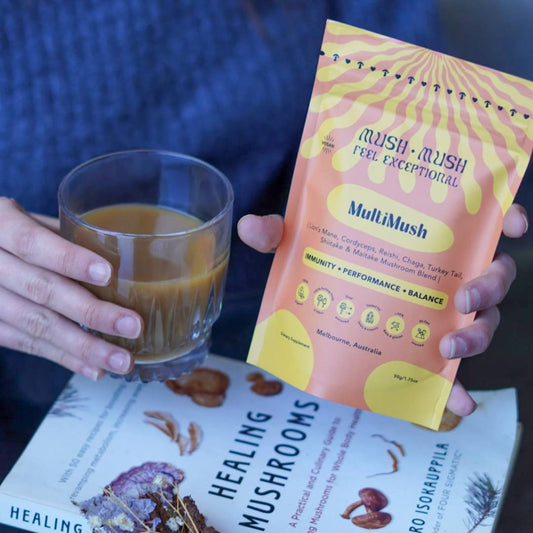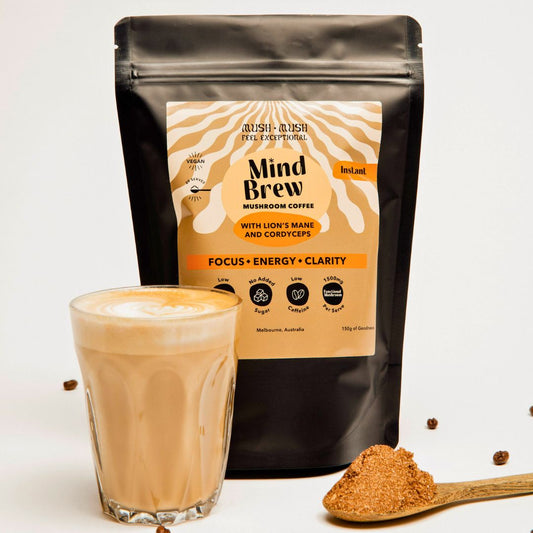If you’ve ever found yourself Googling, “What’s the difference between an adaptogen and a nootropic?” — you’re not alone.
These wellness buzzwords are everywhere lately, especially in the world of supplements, mushroom powders, and brain-boosting beverages. And while the terms are often used interchangeably, they actually refer to very different mechanisms in the body.
So what do they mean? And how do functional mushrooms fit in?
In this guide, we break down the difference between adaptogens and nootropics, and spotlight the mushrooms that do both — supporting your mind, mood, and stress resilience in one delicious scoop.

🧠 What Are Nootropics?
Nootropics are substances that improve cognitive function — especially memory, focus, creativity, and mental clarity. Sometimes called “smart drugs” or “cognitive enhancers,” nootropics can be natural (like Lion’s Mane or caffeine) or synthetic (like modafinil).
What makes something a nootropic? It must:
— Enhance memory or learning capacity
— Support brain function under stress
— Be safe and non-toxic
Common natural nootropics include:
— Lion’s Mane mushroom
— Bacopa Monnieri
— Rhodiola Rosea
— Ginkgo biloba
— L-Theanine
Unlike quick-fix stimulants, nootropics often support long-term brain health — helping the brain grow new connections, protect neurons, and reduce mental fatigue.
🧘 What Are Adaptogens?
Adaptogens are natural substances that help the body adapt to physical, mental, or emotional stress. They work by balancing the hypothalamic-pituitary-adrenal (HPA) axis, which controls your hormonal response to stress.
To qualify as an adaptogen, a plant or mushroom must:
— Help the body resist stressors (physical, chemical, or biological)
— Maintain homeostasis (internal balance)
— Be non-toxic and safe for long-term use
Common natural adaptogens include:
— Reishi mushroom
— Cordyceps mushroom
— Ashwagandha
— Holy basil (Tulsi)
— Schisandra berry
Adaptogens don’t force your body in one direction. Instead, they modulate — it’s less about stimulation and more about balance. Think of them as the buffer zone between you and burnout.
🍄 Mushrooms That Are Both Adaptogenic & Nootropic
The real magic happens when you find ingredients that do both — support brain performance while also increasing resilience to stress. Luckily, some of the most powerful functional mushrooms tick both boxes.
1. Lion’s Mane (Hericium erinaceus)
— Nootropic: Stimulates NGF (nerve growth factor), supports brain regeneration, focus, and memory
— Mild adaptogen: May reduce anxiety and regulate mood over time
— Best for: Students, professionals, creatives, or anyone looking to reduce brain fog and increase mental output
2. Cordyceps (Cordyceps militaris)
— Nootropic: Increases oxygen uptake and energy at the cellular level
— Adaptogen: Enhances physical and mental stamina, balances adrenal function
— Best for: Athletes, busy parents, morning coffee alternatives
3. Reishi (Ganoderma lucidum)
— Adaptogen: Regulates the nervous system, reduces anxiety, improves sleep
— Indirect nootropic: By improving sleep and reducing cortisol, it indirectly supports better mental clarity
— Best for: People with anxiety, poor sleep, or chronic stress
4. Chaga (Inonotus obliquus)
— Adaptogen: Rich in antioxidants, helps reduce oxidative stress
— Mild nootropic: Supports long-term brain health through immune and cellular support
— Best for: Daily resilience, immunity, and clean energy
🧪 Quick Comparison Chart
| Feature | Nootropics | Adaptogens |
|---|---|---|
| Main focus | Cognitive function | Stress response + homeostasis |
| Acts on | Brain, neurons, neurotransmitters | HPA axis, adrenal glands, hormones |
| Immediate effect | Often (e.g. focus boost) | Often cumulative over weeks/months |
| Best for | Mental clarity, focus, memory | Resilience, energy, calm |
| Example Mushrooms | Lion’s Mane, Cordyceps | Reishi, Cordyceps, Chaga |
🔗 References
-
Xu, L. et al. (2022). Neuroprotective effects of Hericium erinaceus (Lion’s Mane) on cognitive decline. Journal of Ethnopharmacology.
— This study explores Lion’s Mane’s effects on nerve growth factor (NGF) and cognitive enhancement. -
Panossian, A. & Wikman, G. (2010). Effects of adaptogens on the central nervous system and the molecular mechanisms associated with their stress-protective activity. Pharmaceuticals, 3(1), 188–224.
— A comprehensive scientific review of how adaptogens like Reishi and Rhodiola work to balance stress. -
Holliday, J., Cleaver, M. (2008). Medicinal value of the genus Cordyceps (Fr.) Link mushrooms: a review. Journal of Mycology.
— Summarises the benefits of Cordyceps in energy, immunity, and performance enhancement. -
Chen, S. et al. (2019). Ganoderma lucidum (Reishi) in the treatment of stress-related disorders: pharmacological evidence and clinical applications. Integrative Medicine Research, 8(2), 123–130.
— Provides evidence of Reishi’s calming and stress-regulating properties. -
Zhang, J., An, Y., Gao, Y. (2020). Chaga mushroom: Potential benefits and clinical research review. Frontiers in Pharmacology.
— An overview of Chaga’s antioxidant profile and its potential as a neuroprotective agent.






